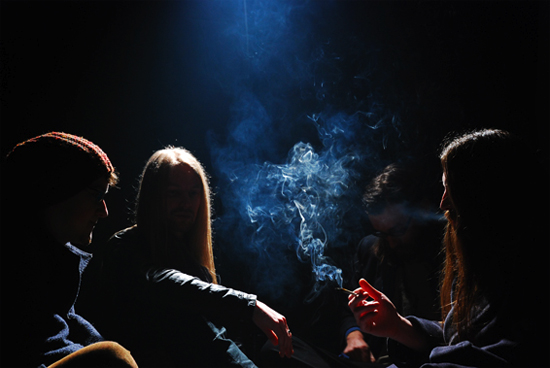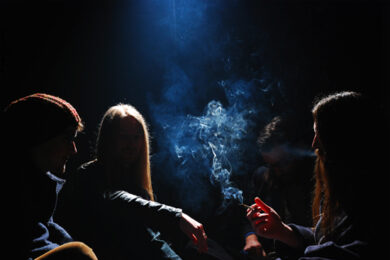"What’s in a name? That which we call stoner/doom, by any other name, would dispense hazy, acrid riffs just as heavy."
With the possible exception of some of the bands doing the rounds in the digi-grind or death/grind scene that have elected to attach to themselves such uncomfortably evocative monikers as ‘Torsofuck’ or ‘Skat Injector’, the murky and often much maligned stoner/doom sub-genre is undoubtedly home to some of the worst, most abysmally awful and paraphernalia-punning band names you’re likely to come across. Bongzilla – "ooh!" Belzebong – "aahh!" Stoned Jesus – "eeurgh!" And – my personal (least) favourite – Stoner Kebab. I mean, seriously, you may as well call yourself ‘Hitler’s Cockring’, because no matter how good your riffs are – and Stoner Kebab have a few decent ones – no one is going to want to wear a t-shirt that says ‘Stoner Kebab’ on it.
In spite of their particularly blunt handle however, there has always been something about Newcastle’s Bong that has set them apart from others that worship at the altar of the devil’s drainpipe. On releases like 2009’s self titled LP and even up to last year’s Beyond Ancient Space their lengthy, doom based drones, along with Dave Terry’s hollow, resonating vocals, sounded something like the reverberating hum of a vast cosmic army physically heaving the sun over ancient pyramids. Something aligned them with their moniker in an onomatopoeic sense, just as much as any other.
And there’s something about new LP Mana-Yood-Sushai , too. There’s a clarity there – not a polish, not a removal of their viscous textures – but a clarity that sees you being pulled into the spaces between the drones, rather than flattened by the weight of them. Is this to do with the fact that the Indian elements brought to the band by Ben Freeth’s Sitar and Shahi Baaja are more fully realised than ever? Or the fact that it was recorded in a professional studio for the first time? The Quietus caught up with bassist/vocalist Dave Terry to find out – although as we found out, whilst his band might craft lengthy, exploratory music, Terry is a man who knows what he wants to say, and says it in as few words as needed.
So Dave – new Bong album, new Bong logo. It sort of feels like the start of a new chapter.
DT: Possibly, in the same way that any release is I guess. But there have been a few other differences this time – and with the way we’ve done the studio recording, as well.
I was going to ask about that – I hear it’s the first time Bong have recorded in a professional studio?
DT: In a professional studio, yes. We have done a studio recording before, but not to the same extent as we’ve done this time at Greg’s studio.
And tell me: what prompted the decision to go professional this time?
DT: We had the opportunity, and we thought we’d give it a try – just to see how it works really.
Simple as that, hey? What have been the advantages of doing it professionally? I mean, I think you can tell in the clarity of the recording that something’s different, but what about from the band’s perspective?
DT: It’s a very different experience really, which probably came out in the sound of the album – more laid back, perhaps, than when it’s just us left in a room together playing. But yeah, it was good, it’s good to hear the various sounds a lot better than on some of our other releases.
The artwork is a slight departure from past works, and you’ve changed your logo too – who was responsible for that?
DT: I did the logo and the artwork for the new album.
Oh, really?
DT: Yeah. It just seemed to fit. The old logo was sort of tongue-in-cheek, with the inverted cross at the bottom, and I just figured that we needed something that was a bit more like the music that we were playing, really. It was almost like a joke when it was first done – the old logo – so many years ago.
But I guess in a way that old logo sort of fitted with the name – I mean, ‘Bong’? It’s a little on the nose isn’t it?
DT: [Laughs] Yeah, it’s pretty much tongue-in-cheek really, it always has been, right from the start. But it just sums up our music pretty well, doesn’t it. And it’s a bit of a tribute to Gong too – we’re all big fans of them, so there’s that aspect to it too.
I’m probably pronouncing it wrong but the new record Mana-Yood-Sushai, it’s named after a god from the works of Lord Dunsany, right?
DT: Well as far as I know that’s the right pronunciation – it’s all from texts so I’m not entirely sure of the correct pronunciation myself – but it’s something that I’ve read a lot of and has been a huge influence on me not just lyrically but in the atmospheres we’ve been creating. So it seemed fitting to do something based around his mythology.
Mana-Yood-Sushai is, in the texts, the creator of all gods. He’s being kept asleep, because when he awakes, his awakening will cause the end of the world. Even his own priests are forbidden to pray to him in case he wakes up.
But you’re trying to wake him up?
DT: Yeah, I suppose so!
Bong – Dreams Of Mana-Yood-Sushai from Funk Drops on Vimeo.
How much, for you, has Bong’s sound changed over the years? Has it always been the plan to evolve to a more ‘tantric’ sound?
DT: Yeah, it’s definitely changed a lot, especially since the start when we were a three piece doing lot’s of sludgier stuff. But it’s become slower and more eastern as we’ve gone on somehow. I think it’s mainly a reflection of our changing tastes as much as anything though. Back then I used to listen to a lot of early Electric Wizard, Sleep and things like that, but as time’s gone on I’ve started to listen to a lot more krautrock and that side of things.
Bong always sounds to me like it’s very heavily improvised – is that the case?
DT: Yeah, it is. Everything comes from us practicing and jamming, trying stuff out and making mistakes. We’ll usually end up with a new riff that way, so each of the songs will end up with one riff that we’ll just improvise around.
So will you have the bare bones of a track before you enter the studio, or is it all created on the job, so to speak?
DT: We only have vague ideas for the tracks before we go in really. With Mana-Yood-Sushai I just had an idea and one riff that we tried – although we ended up using a different one anyway. Trees, Grass And Stone was entirely written there and then in the studio.
You’ve already mentioned some of your earlier influences, what are some of the musical influences that permeate the music of Bong these days? Presumably there’s a growing influence from classical Indian music?
DT: Yeah, we all sort of enjoy the [Seattle based world and obscure music label] Sublime Frequencies side of things, [and] a lot of Far Eastern stuff. But that only really comes through in Ben [Freeth, sitar & shahi baaja]’s sound, as that’s mainly his personal influences rather than anything else.
Often geography can have quite an impact on a band’s sound. I always sort of imagine Bong living some sort of Sufi-esque existence, ensconced in some dark monastery perched atop a Himalayan mountain. But you’re from Newcastle. There seems to be a disconnect between your geography and your style…
DT: Actually I don’t think that there is really. There’s been a great drone and noise scene here for at least the last 10 years now. Bands like Skullflower and Jazzfinger are both from the area – and people like that. Skullflower especially are one of the main influences on our guitarist Mike [Vest].
But I mean nonetheless, your music doesn’t necessarily conjure up images of industrial, urban sprawl in the way that, say, someone like Kyuss ‘sound’ like the desert they grew up in.
DT: I think we spend a lot of time in other places, rather than where we actually are.
How essential is marijuana to the music of Bong?
DT: I don’t know how ‘essential’ it is – I’ve spoken to a lot of people who enjoy our music without any drugs at all. But for us it’s just something that we use a lot and it helps just to disconnect things from the rational mind and to really just get into the music itself.
It’s really quite an experience seeing Bong live, and you’ve released an innumerable amount of live LPs and EPs – how much are Bong more or less a live band as opposed to a recorded one?
DT: We are essentially just a live band really. Our various releases – with the possible exception of the last one – have just been us playing live and then recording it, whether there’s an audience there or not. So everything’s been along similar lines to a live release, even the studio ones. Even the last studio release we did all in one take with no overdubs.
Is this something you think about, then, when you go to play a show – will you have a riff or two in mind and then just jam on stage, or is there more of a plan?
DT: We’ll decide which songs we’re going to be playing – usually one or two per night – and then how we’re going to roughly tie them together with a drone section, or… I mean, there are never any breaks between songs, they just evolve one song into the next.
Money – and reality – being no object, where for you would be the ideal place for Bong to play live?
DT: Some moon of off Arcturus probably! If you’re thinking slightly more realistic than that I think that Roadburn is the ideal thing for us really. The people are there for that sort of music and the atmosphere is amazing. So as far as certain terrestrial venues go, I think Roadburn is the best place we could hope to play.
It’s interesting that you say that about the crowd at Roadburn – have you ever had any experiences in the lifespan of Bong where you’ve been booked for a show with, like, a load of death metal bands or something, and the audience has really taken umbrage at what you’re doing?
DT: We’ve had a lot of gigs with a variety of bands – everything from pop punk, hardcore and death metal bands – but I think that people either just leave the room because they can’t handle the drone anymore, or they just stay and enjoy it. There’s never been a time where we’ve really felt that we’ve been in the wrong place.
So never any running battles with an unappreciative audience or anything?
DT: No, not at all – we’ve been quite fortunate really.
Finally, what state of mind should one be in to best enjoy the music of Bong?
DT: Detached.



